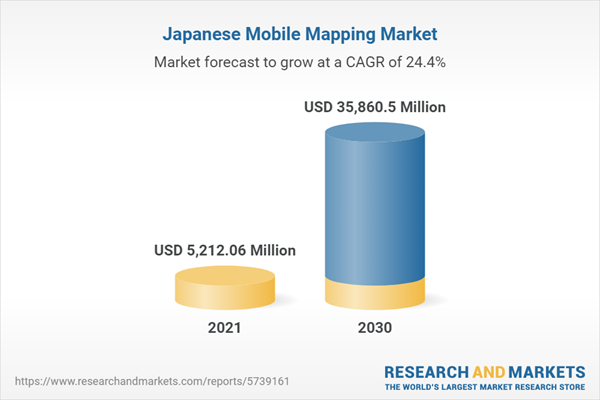The Japan mobile mapping market held a market value of USD 5,212.06 million in 2021 and is estimated to reach USD 35,860.5 million by the year 2030. The market is projected to list a CAGR of 24.4% during the forecast period.Japan Mobile Mapping Market is projected to grow at a CAGR of 24.4% during the forecast period 2022-2030
Satellite mapping technology's increasing use, as well as its smooth integration into smartphones as well as Internet of Things (IoT)-connected devices, is propelling market revenue growth. To fulfil the demand for accurate and up-to-date spatial data, the increased utilisation Global Navigation Satellite System (GNSS) in 3D mapping, environmental control, machine control, accident investigation, including disaster response is driving the mobile mapping market. The mobile mapping market is supporting the creation of novel methods for automatic and speedy data collection, thanks to the help of the most recent 5G internet.
Digital piracy and data security remain major challenges for mobile mapping companies. Information about municipal planning, transportation, and utility administration is stored on mobile mapping data servers. Data hacking is a possibility, and these data may be exposed by cyberattacks such as phishing, malware, and spam. Some pirates hack into accounts in order to steal legitimate users' credentials, which they subsequently sell on the dark web. The risk of data breach and data confidentiality is expected to constrain revenue growth in the mobile mapping market. Governments in certain places carefully limit access to public data.
Growth Influencers:
Increasing investment in city planning and smart city projects
Smart cities are fast growing as a result of increased urbanisation and government-supported programmes around the world. A smart city cannot exist in the absence of a 3D map. Mobile mapping technology for smart cities aims to improve people's quality of life by optimising resources and maintaining sustainability through 3D city modelling, autonomous navigation, traffic and disaster management, digitising roadway property, and pollution reduction. Data management and access have been greatly aided by the use of smartphones and the internet. According to the International Telecommunication Union (ITU), 8.27 billion mobile cellular connections would be available worldwide in 2020. Smartphones make it simple to access geographical data.Companies such as Mitsubishi Electric, Hitachi, and others are utilising mobile mapping technologies for augmented reality 3D models. As a result of 3D urban modelling for mobility, sustainability, IoT, and autonomous driving, the mobile mapping business has grown dramatically. Furthermore, increased 5G technology connectivity has unlocked bandwidths of more than 1 GHz, enabling quality of service to both consumers and mobile mapping technology vendors via a reduction in latency with real-time data transmission. Thanks to 5G technology, mobile mapping firms can now show GIS assets with exact and scalable 3D representations of objects such as buildings, trees, and light posts, as well as night vision photographs. Investments in city planning and smart city projects have increased, as have advancements.
Increasing demand for terrestrial mobile mapping in logistics and transportation especially for aging population
The mobile mapping market is giving new possibilities for establishing new databases and updating old databases in areas such as transportation, utility management, and city planning. Google, Microsoft, Apple, and others are continuing to deploy mobile mapping technologies for aerial photogrammetry or terrestrial surveying using 360° long-lasting real sense cameras (LiDAR). In the monitoring environment, mobile navigation Geographic Information System (GIS) is becoming increasingly popular. Environmental scientists are using mobile mapping GIS tools to assist with tasks such as storm and hurricane forecasting and monitoring. The revenue rise in the mobile mapping sector is being driven by a NASA-funded research project focusing on environmental monitoring and natural resource management.
Segments Overview:
The Japan mobile mapping market is segmented into component, type, application, and end users.By Component
- Hardware
- Software
- Service
By Type
- Vehicle/Land Based Mobile Mapping
- Indoor 3D Mobile Mapping
- Marine-Based Mobile Mapping
- Aerial Mobile Mapping
By Application
- Emergency Response Planning
- Internet Applications
- Road Mapping and Highway Facility Management
- Road Inventory and Asset Management
- Digital Twins Applications
- Others
By End Users
- Agriculture
- BFSI
- Government & Public Sector
- Real Estate
- Retail
- Mining
- Telecommunication
- Transport & Logistics
- Others
Country Overview
The top players in the Japanese industry are focused on key strategies. For instance, in July 2022, Innoviz Technologies Ltd., a leading provider of high-performance, automotive-grade LiDAR sensors and perception software, announced today that Japan Post, a special private company under the jurisdiction of the Ministry of Internal Affairs and Communications that provides postal and logistics services, as well as banking and life & non-life insurance agency services, intends to construct digital maps using Innoviz's high-performance Innoviz,. Similarly, in January 2017, Mitsubishi Electric Corporation and Mitsubishi Electric US, Inc. released updated model of their Mitsubishi Mobile Mapping System, the MMS-G220. The MMS-G220 is a highly accurate measuring system that uses GPS antennae, laser scanners, and cameras placed on cars. The device collects 3-D location data of road surfaces and roadside elements with an absolute accuracy of 4 inches, allowing the construction of comprehensive 3D maps with the accuracy required for autonomous driving. The new model will be introduced in the Asia-Oceania region first. Such moves propel the market growth in Japan.Competitive Landscape
The top players in the market held around 75% market share. The prominent players operating in the Japan mobile mapping market include Topcon Corporation, PASCO Corporation, NV5 Japan, Inc., Esri India Technologies, Genesys International, McElhanney companies, Mitsubishi Electric Corporation, Quantum Spatial, Timmons Group, Dynamic Map Platform Co., Ltd., and others. Genesys International Corporation is an Indian mapping, surveying, and geospatial services company. In advanced mapping, surveying, and geospatial services, they are a leader. The company provide specialist services in the Geographical Information System (GIS) and Geospatial Engineering domains with a team of over 2000 professionals and extensive experience.The Japan mobile mapping market report provides insights on the below pointers:
- Market Penetration: Provides comprehensive information on the market offered by the prominent players
- Market Development: The report offers detailed information about lucrative emerging markets and analyzes penetration across mature segments of the markets
- Market Diversification: Provides in-depth information about untapped geographies, recent developments, and investments
- Competitive Landscape Assessment: Mergers & acquisitions, certifications, product launches in the Japan mobile mapping market have been provided in this research report. In addition, the report also emphasizes the SWOT analysis of the leading players
- Product Development & Innovation: The report provides intelligent insights on future technologies, R&D activities, and breakthrough product developments
- Pricing Analysis: Pricing analysis of various components used in the manufacturing of mobile mapping
- Manufacturing Cost Analysis: Cost-share of various components in mobile mapping tools
The Japan mobile mapping market report answers questions such as:
- What is the market size and forecast of the Japan mobile mapping market?
- What are the inhibiting factors and impact of COVID-19 on the Japan mobile mapping market during the assessment period?
- Which are the products/segments/applications/areas to invest in over the assessment period in the Japan mobile mapping market?
- What is the competitive strategic window for opportunities in the Japan mobile mapping market?
- What are the technology trends and regulatory frameworks in the Japan mobile mapping market?
- What is the market share of the leading players in the Japan mobile mapping market?
- What modes and strategic moves are considered favorable for entering the Japan mobile mapping market?
Table of Contents
Chapter 1. Research Framework
Chapter 2. Research Methodology
Chapter 4. Japan Mobile Mapping Market Overview
Chapter 5. Japan Mobile Mapping Market Analysis, By Component
Chapter 6. Japan Mobile Mapping Market Analysis, By Type
Chapter 7. Japan Mobile Mapping Market Analysis, By Application
Chapter 8. Japan Mobile Mapping Market Analysis, By End Users
Chapter 9. Company Profile (Company Overview, Financial Matrix, Key Product landscape, Key Personnel, Key Competitors, Contact Address, and Business Strategy Outlook)
Executive Summary
The Japan mobile mapping market is expected to grow rapidly over the forecast period due to increased adoption of satellite mapping technology and smart city projects. Furthermore, growing investment in strategic movements is expected to boost market expansion. By 2030, the market is expected to be worth USD 35,860.5 million. Furthermore, significant market participants are actively engaged in strategic activities such as collaborations, product launches, and joint ventures. The market is divided into components, types, applications, and end users.Companies Mentioned (Partial List)
A selection of companies mentioned in this report includes, but is not limited to:
- Topcon Corporation
- PASCO Corporation
- NV5 Japan, Inc.
- Esri India Technologies
- Genesys International
- McElhanney companies
- Mitsubishi Electric Corporation
- Quantum Spatial
- Timmons Group
- Dynamic Map Platform Co., Ltd.
Table Information
| Report Attribute | Details |
|---|---|
| No. of Pages | 94 |
| Published | December 2022 |
| Forecast Period | 2021 - 2030 |
| Estimated Market Value ( USD | $ 5212.06 Million |
| Forecasted Market Value ( USD | $ 35860.5 Million |
| Compound Annual Growth Rate | 24.4% |
| Regions Covered | Japan |









